|
|
|
Sort Order |
|
|
|
Items / Page
|
|
|
|
|
|
|
| Srl | Item |
| 1 |
ID:
132468
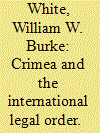

|
|
|
|
|
| Publication |
2014.
|
| Summary/Abstract |
Putin's exploitation of the tension between the principles of non-intervention and self-determination is in the tradition of great-power interaction with international law. But Russia's interpretation sets dangerous precedents.
Crimea is Russia's. The March 2014 referendum and Russia's subsequent annexation of Crimea are now events of history, even while the territorial borders and political future of the rest of Ukraine remain contested. Yet, as international attention has moved from Sevastopol to Kiev and more recent crises elsewhere, a key balance between two of the most fundamental principles of the post-Second World War international legal and political order remains at stake.
|
|
|
|
|
|
|
|
|
|
|
|
|
|
|
|
| 2 |
ID:
130834
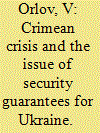

|
|
|
|
|
| Publication |
2014.
|
| Summary/Abstract |
The author offers opinions on the Budapest Memorandum, a 1994 agreement between Russia, Ukraine, Great Britain and the U.S. offering security guarantees for Ukraine in return for its nuclear disarmament. Citing the history of Ukraine's foreign relations since 1991, It is stated that since the U.S. and Great Britain have recognized the provision government created in 2014 while Russia has not, the Memorandum has no relevance to Russia's intervention in Crimea.
|
|
|
|
|
|
|
|
|
|
|
|
|
|
|
|
| 3 |
ID:
130838
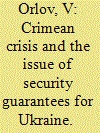

|
|
|
|
|
| Publication |
2014.
|
| Summary/Abstract |
The author offers opinions on the Budapest Memorandum, a 1994 agreement between Russia, Ukraine, Great Britain and the U.S. offering security guarantees for Ukraine in return for its nuclear disarmament. Citing the history of Ukraine's foreign relations since 1991, It is stated that since the U.S. and Great Britain have recognized the provision government created in 2014 while Russia has not, the Memorandum has no relevance to Russia's intervention in Crimea.
|
|
|
|
|
|
|
|
|
|
|
|
|
|
|
|
| 4 |
ID:
130891
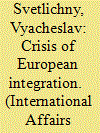

|
|
|
|
|
| Publication |
2014.
|
| Summary/Abstract |
Conferences organized by the journal in Yalta have already become a good tradition. It will be needless to speak of the significance that the Crimean land has for us: historically, ethnically, and mentally. Crimea is always a special place for Russia. There is no other area outside of Russia where so many Russian people live - Russian not only by ethnic origin, not only by blood, but also by spirit and mentality. We often
hear that Ukraine is going its own way, in accordance with its national interests. Of course, the choice of way is the right of every sovereign state. But many keep wondering about this. For example, at a recent meeting with local political analysts, the Chairman of the Council of Ministers of the Autonomous Republic of Crimea, Anatoly Mogilev, put the following question to the audience: "Will the signing of
the document in Vilnius become an irritating factor for Crimean society and lead to a destabilization of the situation?" The question is how to avoid de stabilization because nobody, whether in Moscow or in Kiev or especially in Crimea, is interested in it. No prediction of public behavior in this situation is yet available and we are looking forward to recommendations from the expert community.
|
|
|
|
|
|
|
|
|
|
|
|
|
|
|
|
| 5 |
ID:
131139
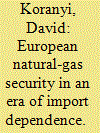

|
|
|
|
|
| Publication |
2014.
|
| Summary/Abstract |
As the Crimean crisis continues to develop, it is becoming clear that Ukraine's reliance on Russia for gas imports may prove to be a fundamental weakness, with the latter wielding price increases as an economic weapon. With Russia threatening to simply cut off these crucial supplies to its neighbour, the conflict has also served to underscore key questions about European energy security more broadly. David Koranyi assesses the status quo before analysing Europe's options for supply diversification, focusing primarily on its central and southeastern regions.
|
|
|
|
|
|
|
|
|
|
|
|
|
|
|
|
| 6 |
ID:
137167
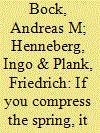

|
|
|
|
|
| Summary/Abstract |
The narrative of an aggressive and neo-imperialist Russia that has dominated analyses of the 2014 Ukrainian crisis lacks theoretical rigour. We argue that a sustainable transformation of the Ukrainian crisis requires an accurate analysis of the context of the conflict, which should include an understanding of Moscow’s perception of the threats to its interests. This policy brief develops a theoretical understanding of the Ukrainian crisis through the lens of Stephen M. Walt’s balance of threat theory. We conclude that a realist analysis will help to explain Russian actions.
|
|
|
|
|
|
|
|
|
|
|
|
|
|
|
|
| 7 |
ID:
131030
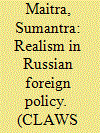

|
|
|
|
|
| Publication |
2014.
|
| Summary/Abstract |
The Crimean crisis marks a pivotal point in the rations between Russia and the West. The revolution in Ukraine, and the subsequent events that unfolded at breakneck pace, including the annexation of Crimea by Russia, throws up a lot of questions, the answers to which will have a massive impact on foreign policy and inter-state relations in the future. It also throws up some broad patterns. The crisis is a worrying return to a trend of land annexation by a great power on a pretext, a trend which was thought to be long dead Munich Conference of 2007. It brings back the debate on the concepts of "Perception and Resolve" in foreign policy. And, perhaps, most importantly, it serves as a vindication of realists over the liberals, constructivists and other paradigms of international relations, and validates the often discussed idea that state interests triumph over every other aspect.
|
|
|
|
|
|
|
|
|
|
|
|
|
|
|
|
| 8 |
ID:
132103
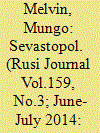

|
|
|
|
|
| Publication |
2014.
|
| Summary/Abstract |
Many saw Russia's annexation of Crimea in March 2014 as a throwback not only to the Cold War, but to earlier memories of Russian imperialist aggression. In such a heated climate, it is essential to understand not only the strategic calculations of contemporary Russia but also its historical, cultural and emotional links to a region that has, for centuries, been at the heart of Russian national identity. Mungo Melvin brings to life this longstanding relationship in a historical, literary and military journey through the birth and struggles of Sevastopol, Crimea's iconic citadel on the Black Sea shores.
|
|
|
|
|
|
|
|
|
|
|
|
|
|
|
|
| 9 |
ID:
155854
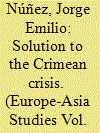

|
|
|
|
|
| Summary/Abstract |
Sovereignty is intrinsic to conflict in international relations. There are various sovereignty disputes around the world caught between legal and political limbo, the status quo and continuous tension, with various negative consequences for all the parties involved. It is increasingly clear that the available remedies have been less than successful, and that a peaceful and definitive solution is needed. The essay considers how theories of distributive justice, and particularly the hypothetical thought experiments proposed by Rawlsian theory, can be used productively with the concept of sovereignty and explores the possibility of a solution for sovereignty conflicts such as the Crimean case by the application of a Rawlsian methodology.
|
|
|
|
|
|
|
|
|
|
|
|
|
|
|
|
| 10 |
ID:
132469
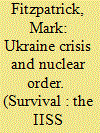

|
|
|
|
|
| Publication |
2014.
|
| Summary/Abstract |
On some issues, particularly Iran, the fallout has been negligible, yet there is still reason for concern. The gravest dangers are the devaluing of security assurances and cracks in the credibility of extended deterrence.
In the immediate aftermath of Russia's annexation of Crimea, gloomy predictions for the non-proliferation agenda were a commentariat staple. On some issues, particularly Iran, the fallout has so far been marginal. Yet there remains ample reason for concern, including over US-Russia cooperation on nuclear security. The gravest proliferation danger stemming from the crisis is the devaluing of security assurances of the kind provided to Ukraine in the 1994 Budapest Memorandum on Security Assurances and potential cracks in the credibility of extended deterrence.
|
|
|
|
|
|
|
|
|
|
|
|
|
|
|
|
|
|
|
|
|